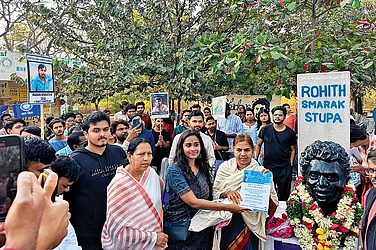The Supreme Court on Tuesday left it for the Centre to take a considered view on the suggestions given by the Delhi Commission for Protection of Child Rights (DCPCR) for the need to provide effective access to vaccination and targeted tracking of pregnant women and lactating mothers in case of Adverse Event Following Immunization (AEFI).
A bench of Justices DY Chandrachud and Sanjiv Khanna said that the court is conscious of the fact that the suggestions which have been made on behalf of DCPCR are issues of policy but these have emanated from a statutory body, and hence can be considered with the same sense of cooperation by the Centre as has been during the hearing of the petition.
It said that the three suggestions which have been made by the DCPCR would undoubtedly require the involvement of application of mind and domain knowledge by experts in the area and the court may not be in the best position to make decisions unaided by an expert determination.
The bench said, “We are of the view that having regard to the inclination shown by the union government it would be appropriate the three ideas which have been outlined earlier are duly placed before the concerned expert group as set out in the affidavit of the Centre so that the suggestions can be factored in at the policy-making level at an appropriate stage”.
The top court said that it appreciates the steps taken by the DCPCR in moving these proceedings and equally, a sense of responsibility with which suggestions have been made and discussed both by DCPCR and the Union government during these proceedings. “We leave it open to the Union of India to take a considered view after evaluating the suggestions, we dispose of the petitions”, the bench said.
During the hearing, advocate Vrinda Grover, appearing for DCPCR, submitted that the affidavit of the Centre is substantially concerned with the issues which have been raised in the petition with the object of ensuring that vaccination for pregnant women and lactating mothers is taken up on priority. The bench noted that the decision to facilitate vaccination for pregnant women was announced on July 2, 2021, whereas the decision for vaccination of lactating mothers was taken a little earlier on May 19, 2021.
“The court has been apprised of the fact that taking these decisions the government has been guided by its experts' group as well as the consensus which has evolved at the international level through the World Health Organization (WHO)”, it said. She said that the women, who visit the vaccination centre may not necessarily be aware of the need to make such a voluntary declaration, and if she is not duly informed by the personnel at the vaccination centre the recording of the status either as a pregnant woman or a lactating mother may remain to be incorporated in the datasheet.
She said instead that if the CoWIN portal at the time of registration can be suitably modified to incorporate a declaration, this would facilitate the entire process, particularly the subsequent monitoring of the health of the pregnant woman or lactating mother as the case may be. Grover further suggested to upgrade and support the surveillance which has been instituted by the government for monitoring AEFI, targeted tracking of pregnant women and lactating mothers can be considered to further bolster the process of monitoring.
She emphasised that when adequate data sets become available, the publication of data will enhance the confidence of the process of vaccination. Additional Solicitor General Aishwarya Bhati, appearing for Centre, responded to the suggestion submitted that each of the three suggestions has been carefully evaluated by the expert group of the Union government.
She said that in the ongoing process where decisions are continuously evolving, the government has certain concerns over the implementation of the suggestions at the present stage but is open to further deliberations within the expert bodies which exist at the present point of time.
Bhati said that with the process of walk-in registration, the registration in the CoWIN portal has been rendered of subsidiary importance but added that the reason why it was believed that a verbal declaration at the time of vaccination would suffice was to ensure that no person is dissuaded from seeking vaccination by introducing an additional column at the time of registration.
She said that there exists a robust mechanism for targeted tracking which has been put in place by the Centre and as regards the publication of the data, it has been submitted that at this stage, any such proposal may be premature but the union government is duly seized of the issue.
Bhati added that the raw data may not be appropriate and is being published after due scrutiny and assessment by expert agencies. In its affidavit, the Centre has said that the pregnant and lactating women are informed about the risks of COVID-19 during pregnancy as also the benefits and likely side effects of the vaccination as per the advisory and Standard Operating Procedures (SOP).
It has said that the guidelines issued for monitoring of adverse events following the COVID-19 vaccine allow for reporting of any suspected adverse event irrespective of the time interval between the day of vaccination and the day of onset of symptoms.
With inputs from PTI.


























